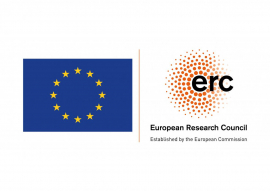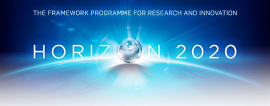10 TSE researchers are currently funded by the ERC.

- ERC "Starting Grants"
support up-and-coming research leaders who are about to establish or consolidate a proper research team and to start conducting independent research in Europe. The scheme targets promising researchers who have the proven potential of becoming independent research leaders. It supports the creation of excellent new research teams and strengthens others that have been recently created.
Hosted by the Foundation JJ Laffont or by the Laboratory TSE-R:
- Olivier DE GROOTE: EDDYNCHOICE - Add in choice: optimizing students' dynamic and interdependent decisions (Grant n°101162723)
- Isis DURRMEYER: PRIDISP - Understanding price dispersion: new structural models of price discrimination and applications (Grant n°852815)
- Mathias REYNAERT: SPACETIME - Econometric Models to Evaluate Environmental and Spatial Effects of Long-Lasting Policies (Grant n°101077168)
- ERC "Advanced Grants"
allow exceptional established research leaders of any nationality and any age to pursue ground-breaking, high-risk projects that open new directions in their respective research fields or other domains. The ERC Advanced Grant funding targets researchers who have already established themselves as independent research leaders in their own right.
- Pierre DUBOIS: EHCI - Economics of Health Care Markets and Innovation (Grant n°101141890)
- Patrick REY: DIGECON - Competition and regulation in the digital economy (Grant n°101055280)
- Jean-Charles ROCHET: DIPAMUTA- Digital Payments, Multidimensional Taxes (Grant n°10105523)
- Jean TIROLE: HWS - Harmony within society (Grant n°101098319)
- ERC "Consolidator Grants"
- Koen JOCHMANS: NETWORK - A coherent approach to analysing heterogeneity in network data (Grant n°101044319)
- Andrew RHODES: DMPDE - Data and Market Power in the Digital Economy (Grant n°10108830)
- ERC "Synergy Grants"
- Umberto GRANDI, Ulle ENDRISS, César HIDALGO and Majia SETALA: ADDI - Advancing Digital Democratic Innovation (Grant n°101166894)
TSE receives significant support from the National Agency (ANR) of Research, the main funder of public research and research partnerships in France.

TSE researchers are involved in research projects funded by the ANR. (Hosted by the Foundation JJ Laffont or by the Laboratory TSE-R):
- Ingela ALGER, Jean-François BONNEFON, Jorge PENA: GROUP - "In-group favoritism in intergroup conflicts" (ANR-22-CE26-0014)
- Stefan AMBEC: TRADEGREEN - "Commerce durable" (ANR-23-CE26-0010)
- Andrea ATTAR, Thomas MARIOTTI, François SALANIE: ACMP2023 - "Private Disclosures in Competing Mechanisms" (ANR-23-CE26-0006)
- Jérôme BOLTE: Regul-AI - "Regulation of AI" (ANR-23-CE23-0029)
- Céline BONNET: DynAPol - "Dynamiques des consommations Alimentaires et Politiques de durabilité : analyses du rôle de l’offre, des préférences et des contraintes"
- Céline BONNET: PARETO- "Producer And RETailer markets Organization" (ANR-23-FRAL-0010)
- Matthieu BOUVARD: FINRIS - "Innovation financière et gestion du risque" (ANR-20-CE26-0010)
- Maxime DEREX: OptiLearn - "Uncovering and mitigating the detrimental effects of social learning on the discovery of new solutions" (ANR-21-CE28-0019)
- Patrick FEVE and the Macro Group - "ComExp / Communication and Expectations" (ANR-23-CE26-0011)
- Victor GAY: ObARDI - "Ontology-based Ancien Régime Data Infrastructure" (ANR-20-CE38-0015)
- Victor GAY: DeNazDb - "A Structured Database of the Denazification Questionnaires from French and American Occupation Zones in Germany, 1945–1949" (ANR-21-FRAL-0005)
- Bruno JULLIEN: EDECOSYSTEM - Economics of Digital Ecosystems: Private and Public Regulation
- Thibault LAURENT: CLIMATE - "International migration, climate change and network effects: A worldwide study" (ANR-22-MIGR-0002)
- Yassine LEFOUILI: TEPREME - "Telemedicine and precision medicine: the role of data in healthcare innovation" (ANR-21-CE26-0014-02)
- David MARTIMORT: LOBBIES - Industries and Lobbies Delaying or Driving the Energy Transition
- Nour MEDDAHI: MLSEDV - From Machine Learning to Structural Econometrics with Discrete Variables
- Anouch MISSIRIAN: CACTEE - Consolidation Agricole : Conséquences Techniques, Economiques et Environnementales (ANR-24-CE32-6888-01)
- Sophie MOINAS: ECLIPSES - The eclipse of lit markets: understanding the rise of opaque trading mechanisms in Europe
- Catherine MOLHO: ENFORCE - Regulating punishment to enforce cooperation: from individuals to institutions
- Mateo MONTENEGRO: DIGILITERACY - Digital Literacy, Misinformation and Governance
- Edouard PAUWELS: MAD- Mathematics of Automatic Differentiation
- François POINAS: RECHC - "Rendements de l'éducation : nouveaux challenges pour les modèles d'investissement en capital humain" (ANR-20-CE26-0011)
- Arnaud REYNAUD: WAT-IMPACTS - "Long-term approaches to assess the economic, social and environmental impacts of water scarcity under uncertainty" (ANR-23-CE32-0003)
- Anna SANKTJOHANSER: LOYALTY - Loyalty in relationships: A theoretical framework
- Jonathan STIEGLITZ: C-HEALTH - "Understanding socio-ecological variation in menstrual cycles to advance female health" (ANR-23-CE36-0011)
- Nicolas TREICH: SentientBCA - "Sentientist Benefit-Cost Analysis" (ANR-24-CE26-2813-01)
The TSE research teams are involved in H2020 projects.

PROJECT H2020
This specific programme supports all types of research activities led by research organisations through transnational cooperation. Their aim is to build and consolidate leadership in scientific and technological fields. The funding of socio-economics and social science projects contribute to more in-depth study and a wider comprehension of complex and independent socio-economic challenges that Europe is currently facing.
- Stefan AMBEC : GEMCLIME - "Global Excellence in Modelling of Climate and Energy" (Grant n°681228)
- Céline Bonnet : FOODCoST - "Food Costing and Internalisation of Externalities for System Transition" Project 101060481
- Zohra Bouamra : BrightSpace - "Designing a Roadmap for Effective and Sustainable Strategies for Assessing and Addressing" Project 101060075

 "Investissements d'avenir", French government funding program
"Investissements d'avenir", French government funding program
In 2010, as part of its €57bn. Investments for the Future program prominently dedicated to research and higher education, the French government launched an ambitious and extensive tender for applications to select the most promising research clusters and units, the laboratories of excellence (LABEX = laboratoires d’excellence). The tender resulted in the award of 171 multi-year LABEX across all disciplines, selected by an international selection jury.
TSE received two of the largest LABEX grants:
a. LABEX IAM-TSE (Incentives, Agents, Markets) was awarded in 2012 with a 15 M€ funding commitment over 8 years for TSE, the largest among the 71 grants in the second wave of LABEX grant awards.
- Download Full document.
b. LABEX IAST was awarded in 2011 with a 25 M€ funding commitment over 9 years, the third largest among the 100 grants in the first wave of LABEX grants. It enabled the creation of the interdisciplinary Institute for Advanced Study in Toulouse (IAST), a brainchild of Jean Tirole in which the economists of TSE play a prominent role. IAST and its LABEX funding are presented on the IAST website.
EUR-CHESS
In 2017, the French government launched another Investments for the Future program to support the creation of innovative and impactful research-based graduate schools: « Ecoles universitaires de recherche » (EUR). TSE's proposal was selected for the "CHESS" project: Toulouse Graduate School Challenges in Economics and Quantitative Social Sciences. The project, soon to be underway, has received a 10,8 M€ funding commitment over 10 years.
- Press Release (in French)
ARPEGE
ARPEGE, a French multidisciplinary consortium led by the French biotech Antabio and conducted jointly with bioMérieux, the Hospices Civils de Lyon and TSE, aims to develop a set of solutions designed to strengthen the capacity of healthcare institutions to fight antibiotic resistance. To develop this project, the consortium has received public funding under the "PSPC" call for projects operated on behalf of the French government by Bpifrance as part of the 'investments for the future' program (PIA).
ARPEGE is the french acronym for Economic, diagnostic and therapeutic approach to antibiotic resistance. This pioneering project combines preventive, diagnostic, therapeutic and economic approaches, thus aiming to provide a multidisciplinary solution to the problem of antibiotic resistance. It is of major importance for public health, structuring innovation capacities and strengthening health systems through an innovative model.
Research carried out by TSE will focus on the identification of new economic models adapted to innovations developed in the antibiotic resistance sector.
According to Jean Tirole, Honorary President of TSE and winner of the 2014 Nobel Prize in Economics, "Antibiotic resistance is a major societal problem, and my colleagues and I are delighted to put forth economics towards project ARPEGE to propose long-term solutions to improve global health."
Contacts: Pierre Dubois and Jean Tirole
Project duration: 2021-2026
TSE is also coordinator or partner in various projects ranging from local projects to international projects
- IDEX
- David Austen-Smith: – IDACC - Information, Deliberation and Collective Choice
- James Hammitt: AMEP – «Advancing Methods for Evaluating Environmental/health policy and wealth»
- Jorgen Weibull: – “Evolution and stability of moral values,social norms and wealth”
- AIR FORCE GRANT
Jérôme Bolte receives several "Air Force" US Government Grants for his research. eg: Grant Air Force, PI, (2022-2025) FA8655-22-1-7012, ”Nonsmooth differential calculus for robustness in Machine Learning”
- RMT FILARMONI - Economie des filières alimentaires - Institut du Porc
Zohra Bouamra is the team leader of this project, from January 2020 to December 2026.
Theme: Modelling production, consumption and markets under imperfect competition to analyse product differentiation.
- Programme Sophie Germain - Climate Policy, Uncertainty, Energy and Firm Resilience Principal Investigator
Manh-Hung Nguyen is the team leader of this project, from July 2024 to December 2025.
Abstract: Vietnam is an industrialized, fast-growing, and energy-import-dependent economy, ranking among the top five countries most severely affected by the adverse impacts of climate change. This proposal aims to explore an emerging channel through which climate change may affect Vietnam’s economy, focusing on the uncertainty linked to international green energy-related climate policies. Specifically, we derive and update a Climate Policy Uncertainty (CPU) index that captures the unpredictability of regulatory changes, market conditions, and investment climates, including those related to the emerging hydrogen economy. Additionally, we conduct theoretical modeling and empirical analysis to estimate the impact of clean energy-related uncertainty on firm productivity using a panel of Vietnamese firms, combined with data from various international sources. By integrating Vietnamese energy-related uncertainty index data with firm-level enterprise data, this project offers insights into how climate change affects productivity in one of the world's largest producers. Furthermore, we test various factors that may help mitigate the adverse consequences of climate change on firm performance during the energy transition through enhanced energy efficiency. For example, firms may adopt more effective management practices and implement new technologies linked to more efficient energy use, potentially improving productivity. Additionally, we investigate whether greater diversity in firm leadership, including the positive impact of female leadership on profitability, correlates with improved resource management and energy utilization in Vietnamese firms. This research aims to provide a comprehensive understanding of how climate policy uncertainty, energy transition, and firm resilience are interconnected.


